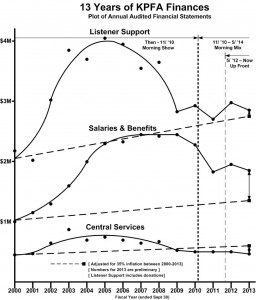Gray Panthers of San Francisco 2940 16th Street, Room 200-4, San Francisco CA 94103 415-552-8800 graypanther-sf@sonic.net
KPFA Radio 1929 Martin Luther King Jr. Way Berkeley, CA 94704
Dear Quincy McCoy,
As long time supporters of KPFA, members of the San Francisco Gray Panthers are writing to tell you of our disappointment in recent management decisions at KPFA.
Because our members have supported KPFA monetarily over the years, we are only too well aware of the financial struggles the station is facing.
That said, we are also long-time supporters of Flashpoints, and deplore the $25,000 cut proposed in the new budget. Flashpoints is a public affairs show with reporters on the ground conducting live interviews, for which it has won multiple awards. How can KPFA cut Flashpoints and propose in the same budget *adding* an additional wire service at a cost comparable to the Flashpoints cuts. It is deeply problematic that KPFA proposes using money taken from quality on-the-ground live investigative reporting such as Flashpoints, and using it for an additional news wire that will result in more news reporting read verbatim from the service.
In addition, given the financial status of KPFA, we are concerned that the budget is also proposing an additional $40,000 for an automatic back-up answering service to collect pledges during KPFA and KPFK fund drives. We have learned that the company is headed by a Tea party member. Each call to donate to KPFA or KPFK routes 90 cents a minute to this company or $3-5 per call.
This corporate call center is owned by Bruce Hough, an Oregon Republican who runs Impact Marketing, a Tea Party advertising and fundraising business. His partner is rabid Tea Party Congressman Sal Esquivel, who traveled to Arizona to stand with Michelle Malkin, the Minutemen and others in support of Arizona’s anti-immigrant SB 1070. Hough and Esquivel also funded vicious attack ads against local Democratic candidate and military veteran Jeff Scroggin. The ads were so disgusting that two out of three local Republican County Commissioners refused to endorse the Tea Party candidate associated with Hough’s Impact Marketing. Hough and Esquivel were also labeled “Rogues of the Week” by the Willamette Weekly for an unethical scam to charge gullible voters to email Congress. Hough and Esquivel also house conservative political action committees at Impact Marketing giving hundreds of thousands of dollars to local and national Tea Party candidates. This flies in the face of what we have come to love and support about the Pacifica mission.
Lastly, Gray Panthers is concerned that the recent hiring process for the new Program Director was flawed. We understand that rules of Pacifica hiring policies were violated as follows:
Section 1: Specifying the number of Local Station Board members that must be on the search sub-committee.
Section 3: Specifying placement of advertisements for positions and distribution of applications for positions.
Section 5: Specifying notice of meetings and their open meeting previsions.
Section 8: Specifying voting procedures in the committee.
Section 10: Specifying disclosure of the selection process, once completed.
Section 12: Specifying the Local Station Board’s oversight of the committee’s process.
As long-time listeners and supporters of KPFA, we feel that precious resources should be spent on furthering KPFA’s mission of community radio, and that decisions over critical personnel matters should be made in accordance with Pacifica policies. Please respond to us addressing our concerns.
San Francisco Gray Panthers Board
Patricia Jackson, Convener
cc via email: KPFA Local Station Board, Pacifica National Board
kpfalsb@googlegroups.com
pnb@pacifica.org



